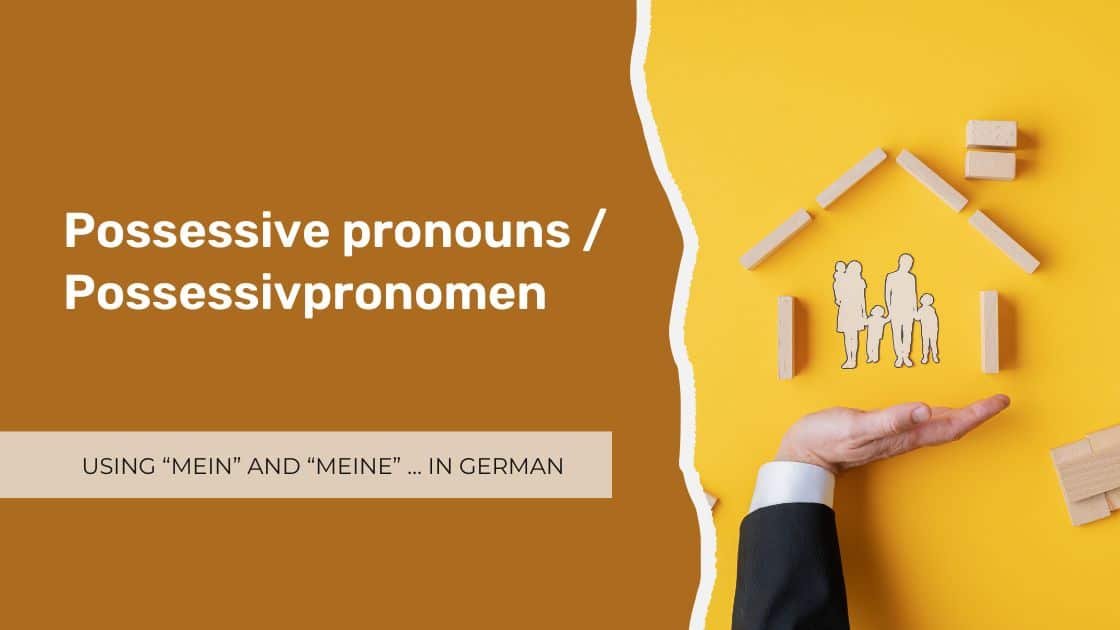Search blog
Online German Conversation Courses in October 2021
Want to speak better German? Improve your skills in an online German conversation course guided by a professional teacher in October 2021!
How to use separable verbs in German
Many find it hard to use separable verbs in German. Find out everything you need to know about them in this article!
When to use “dass” or “das” in German
Many get confused when it comes to “dass” and “das” in German. Find out everything you need to know in this article!
Possessive pronouns – using “mein” and “meine” … in German
Many get confused when it comes to Possessive pronouns in German. Get to know when you should use “mein”, “meine”, “meinen” etc.
Using “um … zu”, “statt … zu” and “ohne … zu” in German
Find out when and how to properly use “um …zu”, “statt … zu” and “ohne … zu” when forming sentences in German.
How to use this or these – “dies-” in German
Many get confused when it comes to the proper usage of “dies-” in German. Get to know everything to use it correctly finally!
How to use which – “welch-” in German
Many get confused when it comes to the proper usage of “welch-” in German. Get to know everything to finally use it correctly!
The difference between “im,” “am” and “um” in German
Prepositions are the supreme discipline when studying any language. Find out in this article when to use “im”, “am” and “um” in German.
How to pronounce b, d and g in German
Many students have problems knowing the pronunciation of “b”, “d” and “g” in German. This article explains the rules to you …
The difference between “müssen” and “dürfen” in German
Many get confused when it comes to the difference between “müssen” and “dürfen” in German. Get to know everything about those two verbs!
The difference between “wollen” and “möchten”
Many get confused about the difference between “wollen” and “möchten” in German. Get to know everything about those two verbs!
How to Effectively Use German Question Words (W-Questions)
Learn how to effectively use German question words, known as W-Fragen, to form correct sentences. This guide covers essential German question words, explains their usage, and highlights key grammar rules!
How to pronounce “ch” in German
Many students have problems knowing when to pronounce a “ch” hard or soft in German. This article explains all the rules to you!
German nouns with the ending “-heit” and “-keit”
The three German genders are a difficult opponent for many students. Find out in this article how you can use the nouns with “-heit” and “-keit” …
When to use “seid” or “seit” in German
If you get lost when it comes to the German “seid” and “seit”, this article will shed light into the dark. Get all the information you need!
How to use schmecken, gehören, passen and gefallen
Many students get confused when it comes to the question of how to use “schmecken”, “gehören,” “passen” and “gefallen”. Get to know all you need in this article!
The difference between “wegen” and “deswegen”
Do you want to understand the difference between “wegen” and “deswegen”? This article will explain to you all you need to know!
Sie, Ihr, Ihnen & Ihrer with a capital letter?
If you are unsure about the rules when to write Sie, Ihr, Ihnen & Ihrer with a capital letter, this article will provide you with all the information you need to know.
How to form the “Partizip 2” in German past tense?
To speak in the German Perfekt tense, you will need to use the “Partizip 2”. Get to know everything in this article to finally become proficient at it.
When to use “zu Hause” or “nach Hause”
Many students get confused when it comes to “go home” and “at home” in German. Find out when you should use “zu Hause” or “nach Hause”.
- Partizip 2
- Werden
- German Grammar
- Umlauts
- Modal verbs
- Verbs
- Auxiliary verbs
- Vocabulary
- Passive
- False friends
- Nouns
- Dativ
- Difference
- A2
- Plusquamperfekt
- Adverbs
- Conjunctions
- Questions
- verbs
- Word order
- Abbreviations
- Nominativ
- Relative clauses
- Pronunciation
- Perfekt
- Question words
- B1
- B2
- Genitiv
- Pronouns
- Adjectives
- Akkusativ
- German online course
- German expressions
- Learning methods
- Negation
- Article
- German idoms
- Time
- Formal speech
- Numbers
- Prepositions
- Possessive pronouns
- Comparison
- Seasons
- Separable verbs
- Futur 1
- Interrogative pronouns
- Date
- Irregular Verbs



















